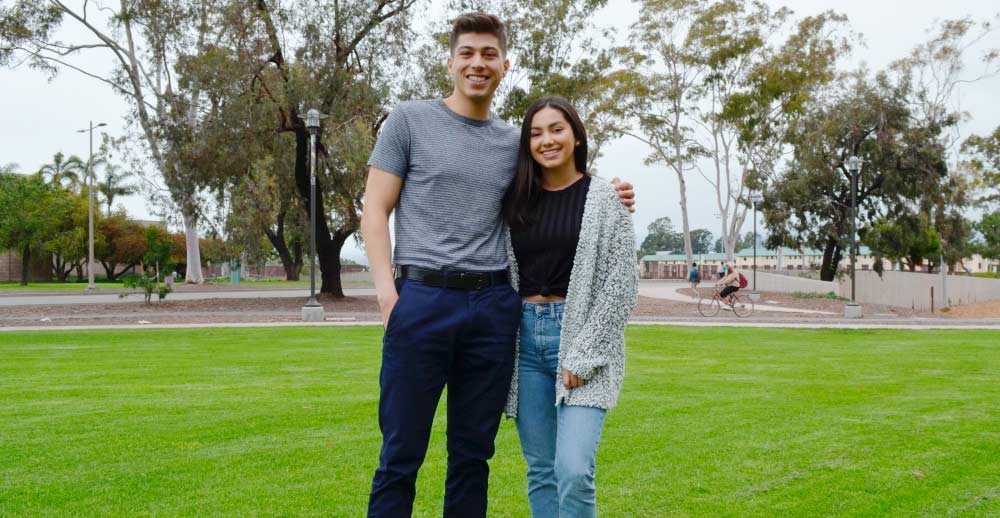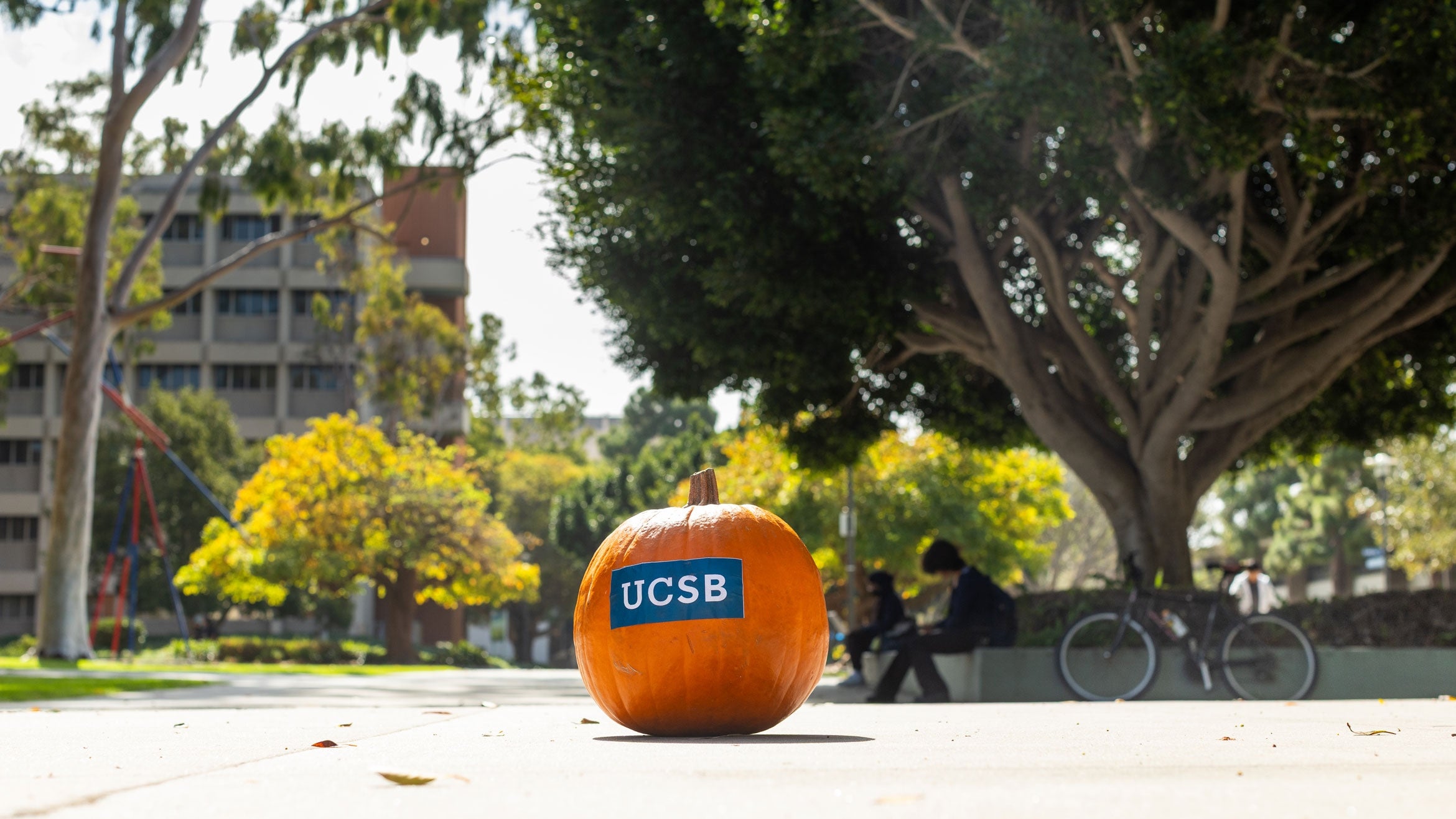
Promise Fulfilled
Rodolfo Hernandez is the eighth of nine siblings in his family. And on June 16, he’ll become the first among them to finish college.
That he has reached this point — graduating from UC Santa Barbara — is impressive on its own. But on top of a bachelor of arts degree in sociology, a minor in applied psychology and designs on graduate school with the GPA to get there, Hernandez will walk away with something few other students can claim: zero debt.
Hernandez is part of the first graduating cohort of UC Santa Barbara Promise Scholars — a group of high-achieving, low-income Californians selected for four-year scholarships to UC Santa Barbara in a program created by the campus that is the first of its kind in the nation.
“It’s mind-blowing to me that I’m even here and graduating and it’s because of Promise Scholars,” said Hernandez, of Lawndale. “It’s been an amazing experience and I’m very, very grateful. My family and I are so thankful, and I feel very privileged to have experienced this. If it wasn’t for this program I probably wouldn’t have been here right now, and probably definitely wouldn’t be graduating.”
The innovative program is the brainchild of Michael Miller, UC Santa Barbara’s assistant vice chancellor for enrollment services. Also longtime director of financial aid and scholarships for the campus, he said he conceived the idea for Promise Scholars from his frustration with “traditional financial aid models, which ask students to commit to a four-year education only knowing how they’re going to pay for one year of college.
“We would bring low-income students and their parents to campus and essentially show them how they were going to pay for freshman year, and would always get the question, ‘What happens after that?’” Miller said. “I could never really tell them, and I really wrestled with that. You wouldn’t buy a car only knowing how to finance 25 percent of it, you wouldn’t buy a home that way. Why does higher ed do that?”
In analyzing data on low-income students on campus and looking over a four-year period, Miller found his “a-ha moment.”
“I was looking to see if their financial situations changed over those years, and not surprisingly it didn’t — more than 97% of those students remained low income for the duration of their college careers,” Miller said. “It occurred to me, ‘Can we make a four-year promise, assuming these students remain eligible?’”
And so was born a pilot project to do exactly that.
Miller and his team would select the students and promise them, for incoming freshmen, a minimum of $120,000 in grants and scholarships over their four years at UCSB, and $60,000 for transfer students over two years on campus. Students would have to maintain a minimum 2.75 grade-point average and remain income eligible.
Hoping to get 25-50 takers in that first year, 2015, they got 124 — “a take rate that was just phenomenal,” Miller said.
Among them was Genesis Codina, a first-generation college student who grew up in Pomona. She “applied to a lot of schools, and got in to a lot, too, including UCLA.” Then the packet from UC Santa Barbara arrived.
“I read it and re-read it and was thinking, ‘Wait, what? Four years of tuition?’” recalled Codina, who will graduate with a bachelor’s degree in global studies and a minor in anthropology. “My mom said, ‘Genesis, do you realize what this is?’ I made my decision right then and there. I could have taken on loans somewhere else, but I didn’t want that burden on my shoulders. I want to go to graduate school so it’s amazing not having that debt and worry.”
The funding for the Promise Scholar program primarily comes from existing financial aid programs but also relies on private philanthropy.
“Over the last couple of years we have started to engage donors around supporting our scholars, which has helped us expand the number of students we are able to support,” Miller said. “The private funding also has helped our students attend summer school and gear up for things like graduate school and career readiness.”
Further, Miller added, donors are able to track their supported scholars throughout their UC Santa Barbara journey, a feature “which has been well received by donors and students alike.”
Today there are 428 Promise Scholars altogether, with a new cohort of 104 students due in the fall to replace those graduating this week.
Financial support is not all the program provides. And in fact, according to Miller and program director Holly Roose, it’s the accompanying benefits — coaching in time management and direct connections to campus resources, among others — that seal the scholars’ success.
“It’s a high-touch model,” said Miller. “We’re not just bring them to campus and saying, ‘Here’s your financial aid, now go do your thing.’ Once we started adding these wrap-around services, providing a network of resources and connections for our students, we started to see positive results almost right away.”
In Roose they have a guidance counselor, mentor, liaison, advocate, big sister and cheerleader all rolled into one. Effusively referring to the Promise Scholars as “her kids,” she keeps the program — and its participants — running smoothly and effectively. She requires regular check-ins and attendance at twice-quarterly events, coaches them in time management, assists them in designing study schedules and connects them to resources across campus. She calls them if their grades start slipping. She’s also been known to call faculty on their behalf in emergency situations.
“These kids are all amazing and once they’re here, they’re mine,” said Roose, who earned her Ph.D. in history from UCSB and had designs on the faculty track before finding her true calling in the Promise Scholars. “It’s not just about them maintaining a 2.75. I want them all to graduate with at least a B- average in case they want to go to graduate school at some point. I want that door to remain open to them.”
Job well done.
Of the original cohort of 124 students, 122 are graduating this week (one joined the military and one moved into industry — “but I have him on text and I’m determined to get him back to school,” said Roose).
Only six of the 122 graduates are below a 2.75 GPA and all are above 2.5 and “in a position to go to grad school if they want to.” Their cumulative grade-point average is 3.23, higher than the cumulative GPA of all other students who were freshmen in 2015.
“The UC Regents have laid out a mandate that all campuses have to improve their four-year graduation rates by 10% by 2030,” Miller said. “Campuses are struggling trying to figure how to make that happen, but I think we have figured it out. I think it’s the high-touch model. Financial aid is key but that high-touch model — connecting our students to resources, whether it’s emergency funding or an academic advisor — is just as if not more important.”
You don’t have to tell Codina, who doesn’t take for granted the opportunities she’s had as a Promise Scholar.
“Seeing the difference between me and other students, I realize how lucky I am to be part of this program,” said Codina, who next will join Teach for America in the LA region and pursue a teaching credential at Loyola Marymount University, with an option to do a master’s degree. “In high school they would tell us, ‘You better get ready because in college there is no one telling you when to go to class or what you need to do.’ Coming from low incomes communities, it’s a scary feeling thinking I have to know it all and do it all on my own.
“This program made me feel really included from the beginning and really supported,” she added. “I’ve always felt I have someone to go to for questions and that I’m not lost. Those resources are super important, and they have definitely helped my success here.”



